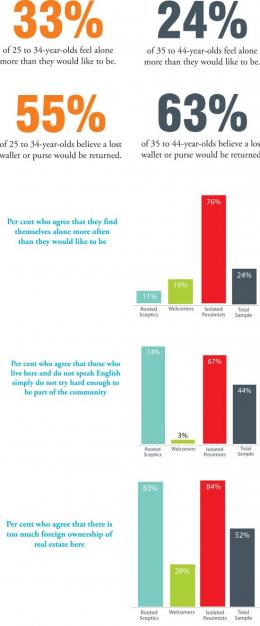Vancouver: United or Divided?

Vancouver: United or Divided?
Connections and Engagement: A Closer Look is a study by The Vancouver Foundation. Almost 4,000 people from our city participated in this study.
We may like to think of youth as a time free of the worries, burdens and sometimes jaded views of adulthood but this is not true of metro Vancouver’s 25 to 34-year-olds.
Our survey on Connections and Engagement showed consistently that those in the 25 to 34-year-old age group feel more isolated and alone in the community, and their attitudes about how metro Vancouver is changing reflect greater resentment than other age groups.
Isolated and alone
It might seem that 25 to 34-year-olds would make friends easier than people in other age groups. But 41 per cent of the age group say that making new friends is difficult, compared to 24 per cent of people 65 and older. Also, this age group is more likely to report that they feel alone more often than they would like to be.
People aged 25 to 34 have been living in their neighbourhoods for a shorter period of time than those in older age groups. They also tend to live in an apartment or a suite in a house. This may explain why they are the group least likely to know their neighbours’ names or to have done a favour for a neighbour. They feel less welcome in their neighbourhood and less likely to feel they belong there; compared to other age groups.
They are certainly more pessimistic about the sense of moral obligation that neighbours possess. They are the age group that is the least likely to think that a lost wallet or purse would be returned by a neighbour.
Understanding the age group
Through an analysis of how the total age group answered the survey questions, we were able to separate the 25 to 34-year-olds into three distinct subgroups:
‘Rooted Skeptics’ comprise 31 per cent of the age group. They:
• have higher incomes and more home ownership
• are most likely to have been born in Canada
• feel welcome in their neighbourhood and in metro Vancouver
• are the most skeptical about the impact of diversity
‘Welcomers’ comprise 39 per cent of the age group. They:
• have the most positive attitudes towards different ethnic groups and non-English speakers
• believe that their neighbourhood would welcome all immigrants or refugee groups
‘Isolated Pessimists’ comprise 30 per cent of the age group. They:
• are the most isolated and find it the most difficult to make new friends
• have been living in their neighbourhood or in Canada for a shorter period of time
• have the lowest income
• are the most pessimistic about inter-ethnic relationships
We analyzed these three sub-groups that make up the 25 to 34-year-olds by looking at their answers to these statements:
1. I find myself alone more often than I would like to be.
2. People who live here and do not speak English simply do not try hard enough to be part of the community.
3. There is too much foreign ownership of real estate here.
Their answers paint a picture of an age group that feels isolated and alone in the community, and that holds more negative attitudes and greater resentment about diversity.
Disconnected and unengaged
1. Our survey shows that the 25 to 34-year-olds who belong to the ‘isolated pessimists’ sub-group report very high feelings of being alone. 76 per cent report feeling alone more than they would like to be, compared to 24 per cent of the total sample.
2. It’s the ‘rooted skeptics”’ who stand out when we look at their responses to the statement ‘People who live here and do not speak English simply do not try hard enough to be part of the community.’ 74 per cent agree with that statement, compared to 44 per cent of all respondents.
3. In the graph below, both the ‘rooted skeptics’ and the ‘isolated pessimists’ report very high agreement with the statement ‘There is too much foreign ownership of real estate here.’ Over 80 per cent agree with that statement, compared to 52 per cent of the total sample.
Facing an uncertain future
The 25 to 34-year-olds have greater resentment than other age groups. Many of these young adults are trying to start careers and families, and are confronting the high-priced housing market as first-time buyers. The challenges they face may contribute to the negative view they hold of Vancouver and the region as a place where only the wealthy can afford to live, and the role they believe foreign ownership has in driving up real estate prices.
Leave a comment









